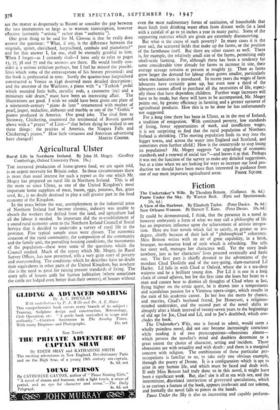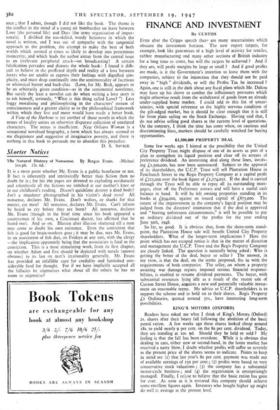Fiction
IT could be demonstrated, I think, that the presence in a novel in however embryonic a form of what we may call a philosophy of life has an important influence upon the achievement of artistic integra- tion. Here are four novels which fail to satisfy, in greater or less degree, chiefly because of their lack of " philosophical " coherence. Miss Benson writes with an air of great capability, in a brisk, brusque, no-nonsense kind of style which is refreshing. She tells her story well, manages her characters well. Yet the story leads nowhere, just as her characters' lives proceed erratically and fizzle out. The first part is chiefly devoted to the adventures of the mordant Chad Doolittle and of the easy-going, slum-nurtured Lil Harley. Lil falls in with Chad at Oxford, where she is a tea-shop waitress and he a brilliant young don. For Lil it is one in a long chain of casual affaires, but for the first time she loses her heart to a man and cannot bear to dismiss all thoughts of Chad when at last, flying higher on the erotic quest, he is drawn into a tempestuous and scandalous passion for a Viennese opera-singer, which results in the ruin of his academic career. In her loss she meets by chance, and marries Chad's boyhood friend, Joe Honeysett, a religious- minded undertaker, and the second part of the novel- shifts us abruptly after a blank interval of twenty-seven years to the beginnings of old age for Joe, Chad and Lil, and to Joe's deathbed, which con- cludes the book.
The Undertaker's Wife, one is forced to admit, would seem a wholly pointless novel, did not one become increasingly conscious while reading it of two preoccupations—obsessions almost— which possess the novelist's mind and doubless determine to a great extent the choice of character, setting and' incident. Those obsessions are with sexuality and with death : and there is a marginal concern with religion. The combination of these particular pre- occupations is familiar to us, to take only one obvious example, through the poetry of Donne. It is a configuration which is apt to arise in any human life, and which must be faced and dealt with. If only Miss Benson had truly done so in this novel, it might have been a significant work. But, alas! she is all at sea with sex, and the intermittent, disrelated interjection of graveyard speculations, which is so curious a feature of the book, appears irrelevant and not solemn, and formally the novel falls to pieces in the hands. Pause Under the Sky is also an interesting and capable perform- ance ; that I admit, though I did not like the book. The theme is the conflict in the mind of 'a young air bombardier on leave between Love (the personal life) and Duty (the army organisation of imper- sonals). I disliked the too-skilled, wordy fictionese in which the novel is written, and I was out of sympathy with the tangential approach to the problem, the attempt to make the best of both worlds which seemed at times so likely to develop into pretentious insincerity, and which leads the author astray from the central issue to an irrelevant peripheral attack—on broadcasting! A certain falsification pervades and distorts the whole. book : I found it diffi- cult to believe in the proffered depth and reality of a love between lovers who are unable to express their feelings with dignified sim- plicity, and must drop continually into the sentimentality of facetious or whimsical banter and back-chat. (Love, for Mr. Beck, appears to be an arbitrarily given condition—as in the sentimental novelettes._ But surely the least a novelist can do when writing a love story is to ask himself, seriously, "What is this thing called Love? ") Less foggy moralising and philosophising in the characters' stream of consciousness and a greater clarity as to the philosophical framework within which they live and move would have made a better book.
A View of the Harbour is yet another of those novels in which the nexus of locality unites an otherwise disparate collection of unrelated characters. The nexus is insufficient. New Orleans Woman is a sensational novelised biography, a form which has always seemed to me illegitimate and suggestive of imaginative poverty, and there is nothing in this book to persuade me to abandon this prejudice.
D. S. SAVAGE.



































 Previous page
Previous page